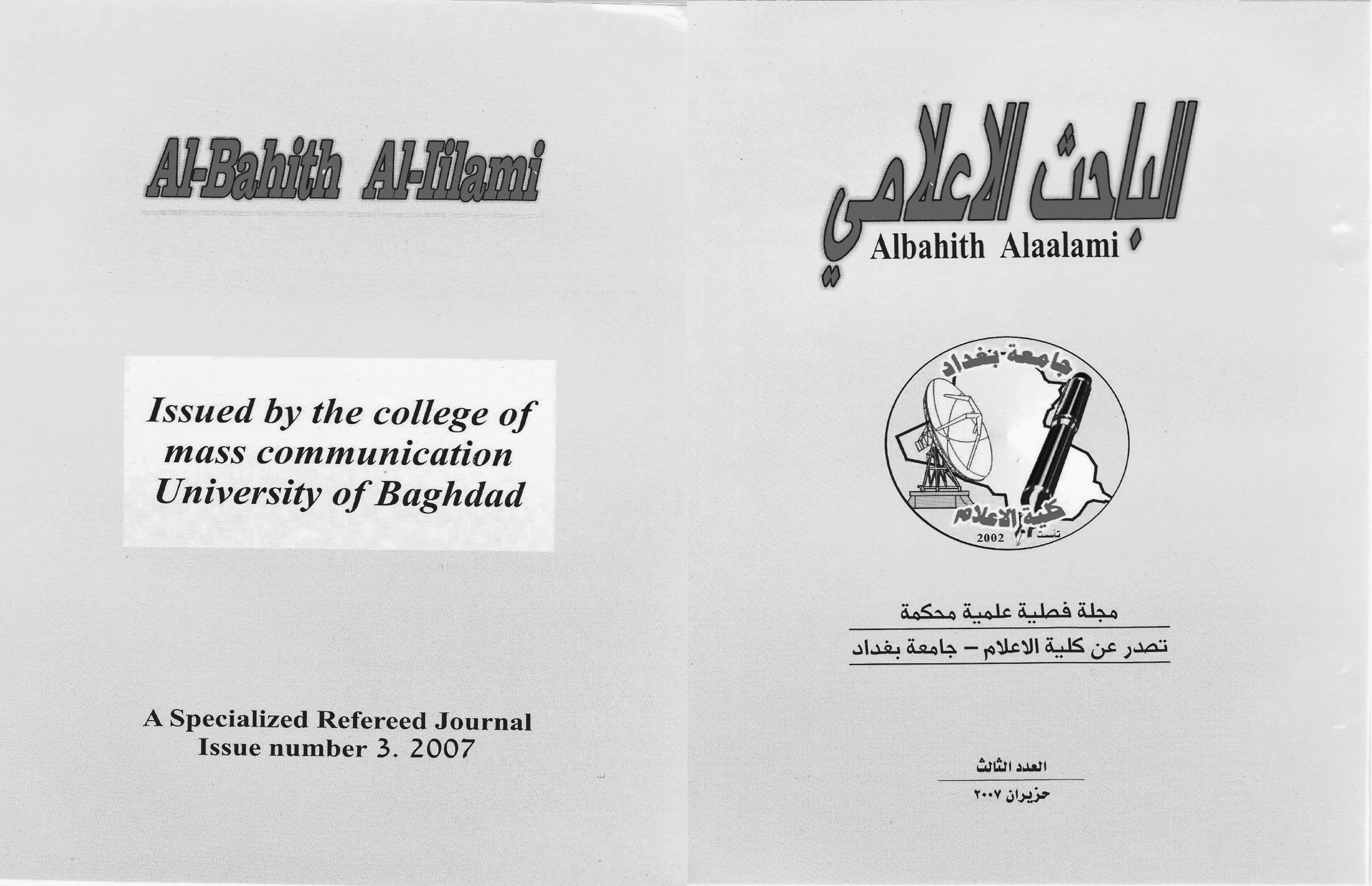IRAQ BETWEEN A CULTURE OF CIVIL SOCIETY AND A CULTURE OF VIOLENCE
DOI:
https://doi.org/10.33282/abaa.v1i3.454Keywords:
Iraq, military government, sectarianism, culture, conflictsAbstract
The title takes its realistic connotations with its symbols, slogans and historical extensions in Iraq, also, the repercussions of the organic crisis that afflicted it for almost half a century, especially after the abortion of the July 14 Revolution and the spread of the culture of weapons, violence and death that we are living in Iraq nowadays.
The topic is suitable for critical analytical studies carried out by specialists in scientific and academic research centers and cultural institutions because they have an important feasibility at the strategic cultural level in Iraq, the Middle East and the world.
Research in Iraq has fallen to the extreme and is no longer effective, to the extent that it represents a severe crisis as it lacks freedom and suitable scientific conditions.
We try in the following pages to discuss this subject from its political, social and sectarian content, as well as, taking advantage of the Iraqi author references, books "memos" and historical testimonies of some leaders, either because they have begun to feel the responsibility, or because some of them were free to publish his manuscript views after his death!
The topic is suitable for critical analytical studies carried out by specialists in scientific and academic research centers and cultural institutions because they have an important feasibility at the strategic cultural level in Iraq and the Middle East and the world.
In any case, it remains a positive point of light in self-criticism and experience in rebuilding man and society on new foundations, away from those black claws that have been ravaging Iraq and Iraqis and messing with slogans over time.
The researcher in the political topic in Iraq opposes the circumstances of the emergence of the Iraqi state and the establishment of the military "national" formations, which became a permanent base in the conflicts and the acquisition of Iraq which has been used to resolve disputes between military leaders, suppression of movements of protest, insurgency, popular uprisings, the emergence of "coup", blocs and personal relations. Perhaps “Sectarianism” may have had an influential role in containing and controlling the military by involving the country in political conflicts and take control over by the mean of these "national" leaders. The cultural environment of these national officers was limited in their professional positions through the military culture they had acquired in their senior ranks in the Iraqi army, as well as, in the Ottoman Empire or through their social affiliation to feudal and tribal families, which had a
special privileges for Britain as one of the first and most important pillars of the occupation and the monarchy in Iraq from its inception until its overthrow in the national revolution of July 1958.
Downloads
References
-2 ﺍﺴﻤﺎﻋﻴل ﺍﻟﻌﺎﺭﻑ، ﺃﺴﺭﺍﺭ ﺜﻭﺭﺓ ١٤ ﺘﻤﻭﺯ، ﻟﻨﺩﻥ ١٩٨٦، ﺹ٤٩.
-3 ﺴﻌﺎﺩ ﺨﻴﺭﻱ، ﺜﻭﺭﺓ ١٤ ﺘﻤﻭﺯ ﺒﻌﺩ ﺃﺭﺒﻌﺔ ﻋﻘﻭﺩ، ﺍﻟﺴﻭﻴﺩ ١٩٩٨، ﺹ١٤٥.
-4 ﻤﺠﻴﺩ ﺨﺩﻭﺭﻱ ﺍﻟﺩﻜﺘﻭﺭ، ﺍﻟﻌﺭﺍﻕ ﺍﻟﺠﻤﻬﻭﺭﻱ، ﻁ١، ﺒﻴﺭﻭﺕ ١٩٧٤.
-5 ﺨﺎﻟﺩ ﺍﻟﺘﻤﻴﻤﻲ ﺍﻟﺩﻜﺘﻭﺭ، ﻤﺤﻤﺩ ﺠﻌﻔﺭ ﺃﺒﻭ ﺍﻟﺘﻤﻥ، ﺍﻟﻭﺭﺍﻕ ﻟﻠﺩﺭﺍﺴﺎﺕ ﻭﺍﻟﻨﺸﺭ، ﺩﻤﺸﻕ ١٩٩٦، ﺹ٤١١.
-6 ﻫﺎﺸﻡ ﻋﻠﻲ ﻤﺤﺴﻥ، ﺘﻁﻭﺭ ﺍﻟﺤﺭﻜﺔ ﺍﻟﻨﻘﺎﺒﻴﺔ ﻓﻲ ﺍﻟﻌﺭﺍﻕ، ﺒﻐﺩﺍﺩ ١٩٦٦، ﺍﻟﺠﺯﺀ ﺍﻟﺜﺎﻨﻲ، ﺹ٣٤.
-7 ﻤﺠﻴﺩ ﺨﺩﻭﺭﻱ ﺍﻟﺩﻜﺘﻭﺭ، ﺍﻟﻌﺭﺍﻕ ﺍﻟﺠﻤﻬﻭﺭﻱ، ﻁ١، ﺒﻴﺭﻭﺕ ١٩٧٤، ﺹ٢٩.
-8 ﻤﺤﻤﺩ ﺍﻟﺩﻟﻴﻤﻲ ﺍﻟﺩﻜﺘﻭﺭ، ﺍﻟﺠﺎﺩﺭﺠﻲ ﻭﺩﻭﺭﻩ ﻓﻲ ﺍﻟﺴﻴﺎﺴﺔ ﺍﻟﻌﺭﺍﻗﻴﺔ، ﺒﻴﺭﻭﺕ ١٩٩٩، ﺹ٢٤٩.
-9 ﻋﻠﻲ ﻜﺭﻴﻡ ﺴﻌﻴﺩ ﺍﻟﺩﻜﺘﻭﺭ، ﻋﺭﺍﻕ ٨ ﺸﺒـﺎﻁ ١٩٦٣/ ﻤﺭﺍﺠﻌﺎﺕ ﻓﻲ ﺫﺍﻜﺭﺓ ﻁﺎﻟﺏ ﺸﺒـﻴﺏ، ﺩﺍﺭ ﺍﻟﻜﻨﻭﺯ ﺍﻷﺩﺒـﻴﺔ، ﺒـﻴﺭﻭﺕ
١٩٩٩، ﺹ١٩٢ـ١٩٥.
-10 ﻋﻠﻲ ﻜﺭﻴﻡ ﺴﻌﻴﺩ ﺍﻟﺩﻜﺘﻭﺭ، ﺍﻟﻌﺭﺍﻕ/ ﺍﻟﺒﻴﺭﻴﺔ ﺍﻟﻤﺴﻠﺤﺔ/ ﺤﺭﻜﺔ ﺤﺴﻥ ﺴﺭﻴﻊ ﻭﻗﻁﺎﺭ ﺍﻟﻤﻭﺕ ١٩٦٣، ﺒﻴﺭﻭﺕ، ﺹ١٢٨.
-11 ﺍﻟﻤﺼﺩﺭ ﺍﻟﺴﺎﺒﻕ ﻨﻔﺴﻪ، ﺹ٧٠.
-12 ﻫﺎﻨﻲ ﺍﻟﻔﻜﻴﻜﻲ، ﺃﻭﻜﺎﺭ ﺍﻟﻬﺯﻴﻤﺔ، ﻟﻨﺩﻥ ١٩٩٢، ﺹ٢١٨.
-13 ﺍﻟﻤﺼﺩﺭ ﺍﻟﺴﺎﺒﻕ ﻨﻔﺴﻪ، ﺹ٢٥٨.
-14 ﻋﻠﻲ ﻜﺭﻴﻡ ﺴﻌﻴﺩ ﺍﻟﺩﻜﺘﻭﺭ، ﺍﻟﻌﺭﺍﻕ/ ﺍﻟﺒﻴﺭﻴﺔ ﺍﻟﻤﺴﻠﺤﺔ/ ﺤﺭﻜﺔ ﺤﺴﻥ ﺴﺭﻴﻊ ﻭﻗﻁﺎﺭ ﺍﻟﻤﻭﺕ ١٩٦٣، ﺒﻴﺭﻭﺕ ﺹ٥٩.
-15 ﺍﻟﻤﺼﺩﺭ ﺍﻟﺴﺎﺒﻕ ﻨﻔﺴﻪ، ﺹ١٤٢.
-16 ﺍﻟﻤﺼﺩﺭ ﺍﻟﺴﺎﺒﻕ ﻨﻔﺴﻪ، ﺹ٢٤٥.
-17 ﻫﺎﻨﻲ ﺍﻟﻔﻜﻴﻜﻲ، ﺃﻭﻜﺎﺭ ﺍﻟﻬﺯﻴﻤﺔ، ﻟﻨﺩﻥ ١٩٩٢، ﺹ٢٨٠.
Downloads
Key Dates
Published
Issue
Section
License
Copyright (c) 2007 author

This work is licensed under a Creative Commons Attribution 4.0 International License.
Authors retain copyright and grant the journal right of first publication with the work simultaneously licensed under a Creative Commons Attribution License (CC BY 4.0) that allows sharing the work with recognition of authorship and initial publication in ABBA journal.


















